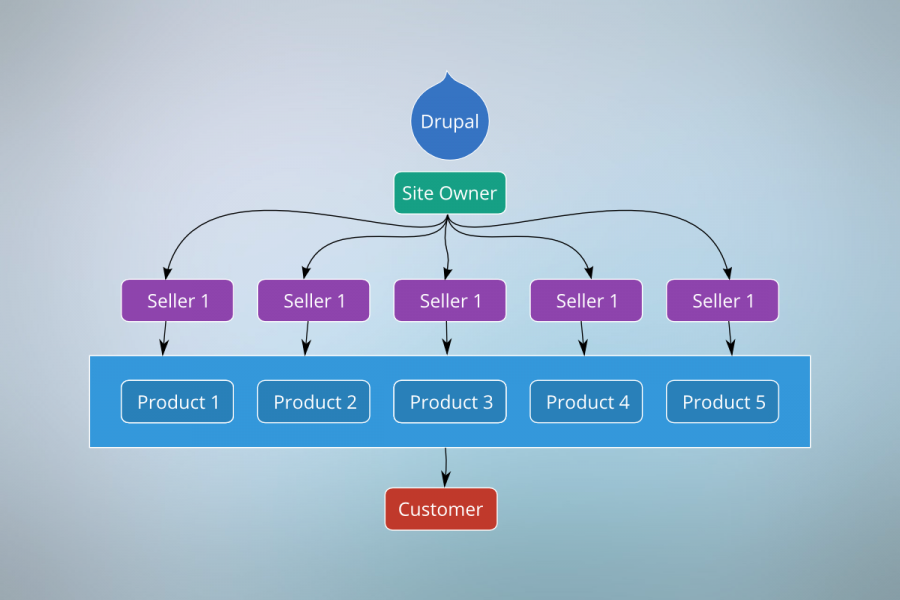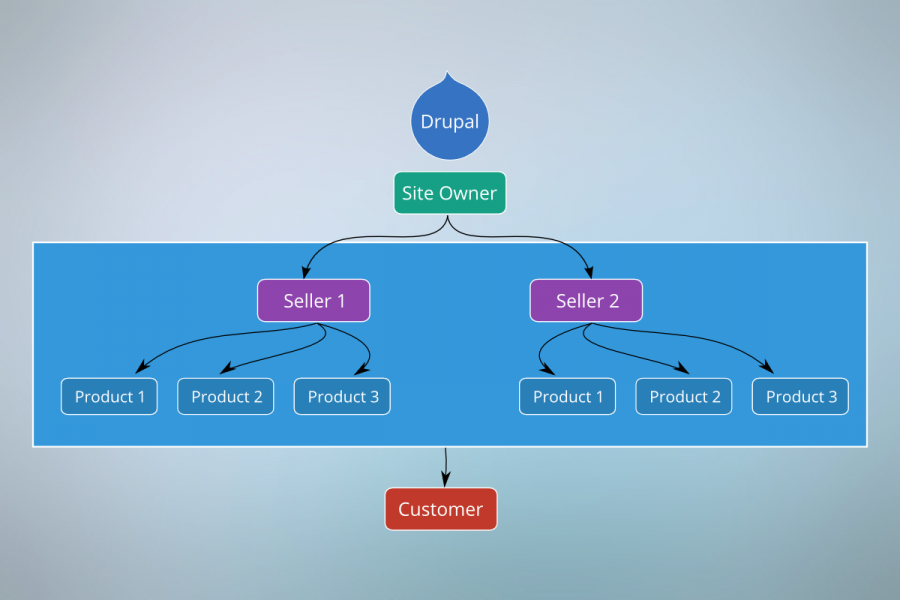21 Essential Features for a Multi-Vendor Online Marketplace
Multi-vendor marketplaces like Amazon, eBay, and Walmart have redefined shopping by aggregating millions of sellers in one digital space. Building such a platform, however, is a complex task, demanding not just technical expertise but also a deep understanding of the evolving e-commerce landscape.

Multi-vendor sites are difficult to build from scratch and also require a great deal more effort to maintain.
Drupal Commerce
Enter Drupal Commerce – A formidable, adaptable module in Drupal, renowned for transforming a basic Drupal site into a comprehensive e-commerce application. Leveraging the power of Drupal Commerce, businesses can evolve their e-commerce stores into thriving multi-vendor marketplaces.
Use Cases for Marketplace
There are two different use cases for digital marketplaces.
1.) Store like Amazon where all the products from the sellers are aggregated in one platform and payment and orders managed centrally.

2.)A marketplace where distinct stores maintain their unique catalog, manage their payments, and handle shipping independently – all under one digital roof

Drupal along with Drupal commerce can be the building block for both models.
Essential Features of a Online Marketplace
- Intuitive User Dashboard: A sophisticated, user-friendly interface for both sellers and buyers, offering a seamless experience with real-time data, analytics, and personalized insights.
- Streamlined Seller Onboarding & Verification: Simplified registration process coupled with a robust, admin-controlled verification system to ensure authenticity and reliability of marketplace participants.
- Adaptive Commission Structure: A flexible commission management system that can be tailored to different seller profiles or product categories, fostering a competitive and fair marketplace environment.
- Detailed Transaction Reporting: Comprehensive reporting tools that provide in-depth insights into sales, expenses, and overall financial performance for each seller.
- Customer-Driven Seller Reviews: A platform for customers to leave feedback and rate sellers, contributing to a trustworthy community and helping buyers make informed decisions.
- Personalized Seller Pages: Customizable pages for each seller, showcasing their business information, product catalog, customer reviews, and ratings.
- Effective Promotional Tools: Advanced marketing and promotional features for enhanced visibility of sellers and their products.
- Efficient Bulk Product Management: Tools for easy import and export of product listings in bulk, ideally in formats like CSV, for efficient inventory management.
- Real-Time Notification System: Immediate updates and alerts for sellers about new orders, customer queries, or changes in marketplace policies.
- Price Comparison Capabilities: A feature enabling customers to compare prices and offerings from different sellers.
- Semantic Search Capabilities: Advanced search engine that understands the context and intent behind user queries, offering more accurate and relevant search results.
- Generative AI for Product Recommendations: Personalized product recommendations generated by AI algorithms, based on user behavior, past purchases, and preferences.
- AI-Powered Chatbots for Customer Service: Responsive AI chatbots for handling customer inquiries, providing instant support, and enhancing the overall customer service experience.
- Augmented Reality (AR) Showcasing: AR technology enabling customers to visualize products in real-world contexts, improving the shopping experience and aiding in decision-making.
- Voice Search Optimization: Optimization for voice search to cater to users who prefer using voice commands, enhancing accessibility and user experience.
- Dynamic Pricing Tools: AI-powered tools for real-time pricing adjustments based on market demand, inventory levels, and user behavior analytics.
- Social Media Integration and Selling: Seamless integration with social media platforms for direct product linking and tapping into social commerce trends.
- Sustainability and Eco-Friendly Filters: Features that help customers identify and choose sustainable and eco-friendly products, meeting the demands of environmentally conscious consumers.
- Virtual Try-On for Apparel and Accessories: Implementation of AI and AR for a virtual try-on experience, allowing customers to see how clothes, eyewear, and accessories might look on them.
- Predictive Analytics for Inventory Management: Utilizing predictive analytics to assist sellers in managing their inventory efficiently by forecasting demand and advising on stock levels.
- Customizable AI-Driven Newsletters: Personalized newsletters and promotional content generated by AI, based on the user's interactions and interests within the marketplace.
Drupal can be used to develop highly flexible applications including the creation of the multi-vendor shopping portal and ensures security and ease of use, catering to diverse sellers and stores.
Zyxware Technologies has strong competence in delivering business solutions customized to your unique business needs. We have over 18 years of experience delivering successful digital technology solutions to our global clientele. We have also successfully implemented ecommerce portals for both B2B and B2C retailers. To learn more, do get in touch with us. We would love to hear from you.



